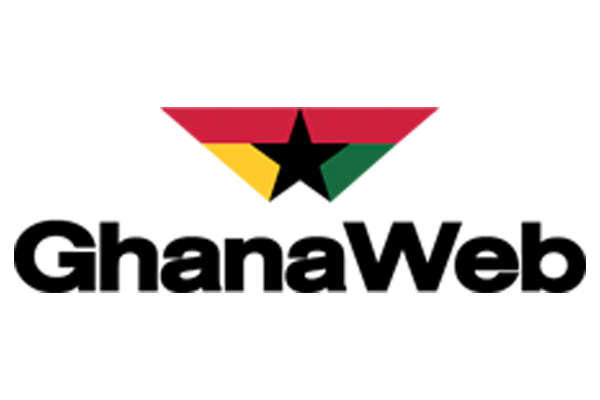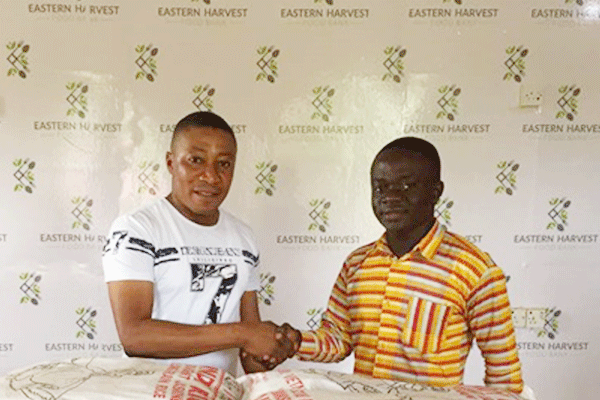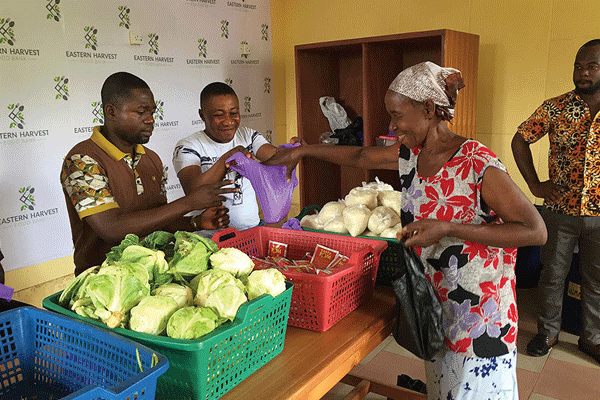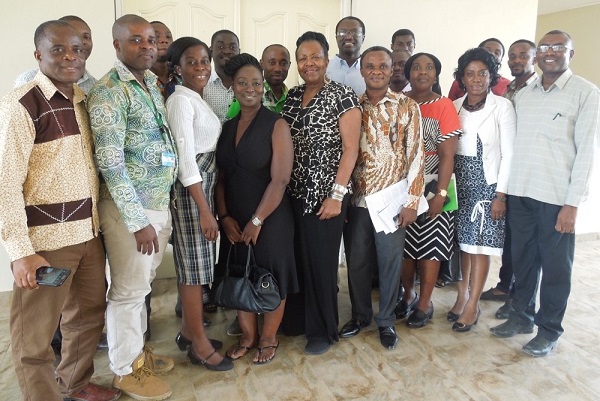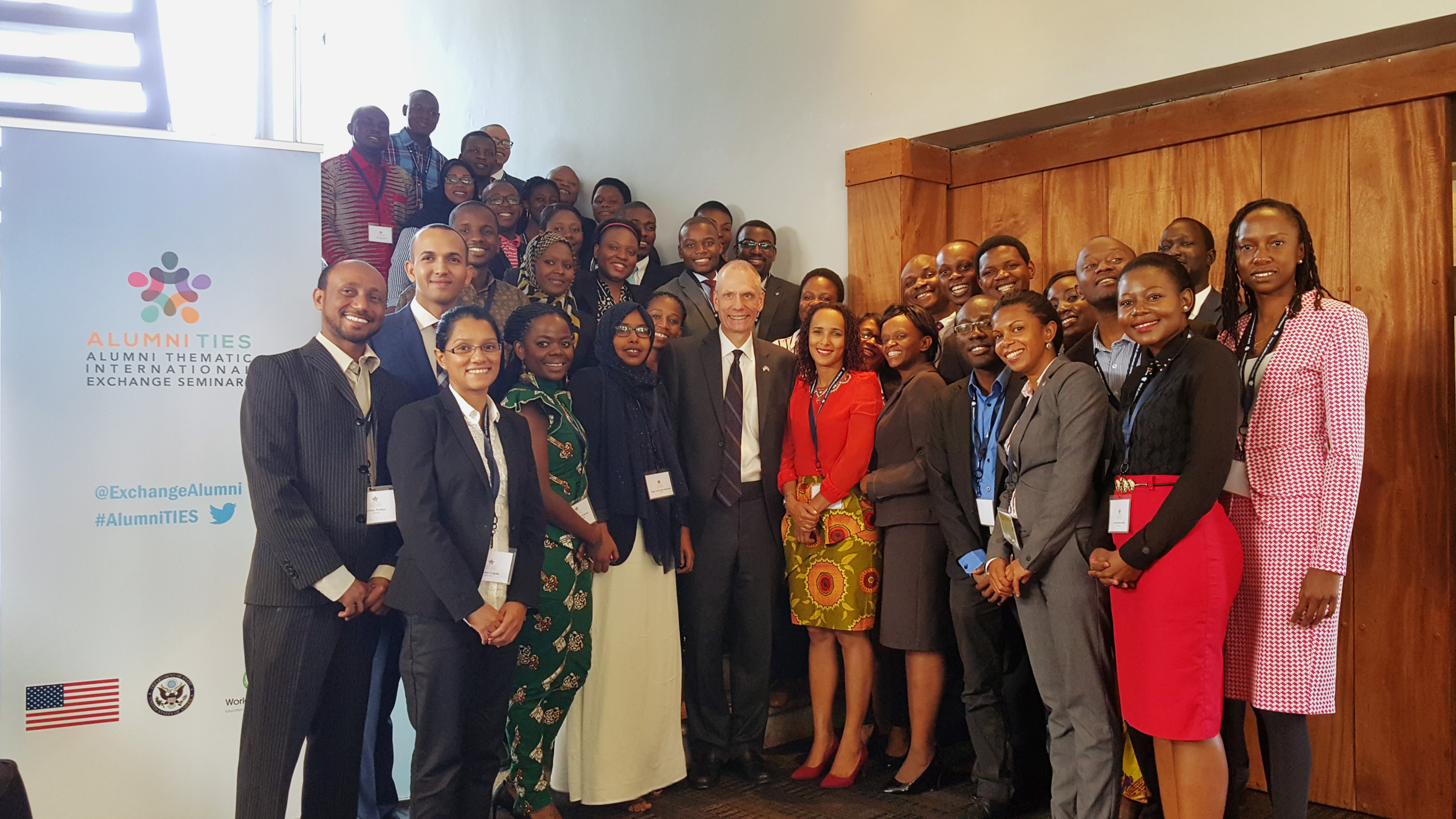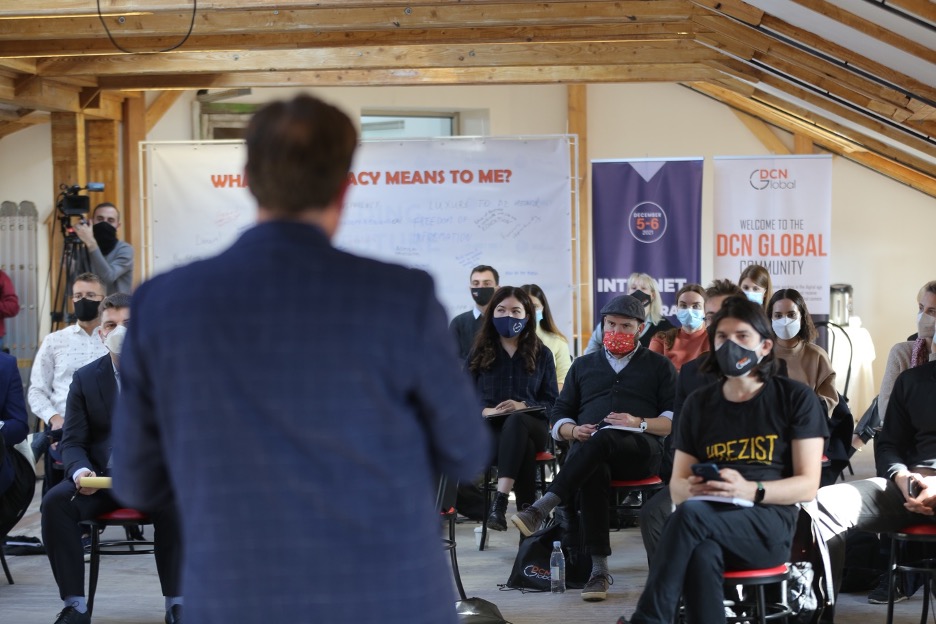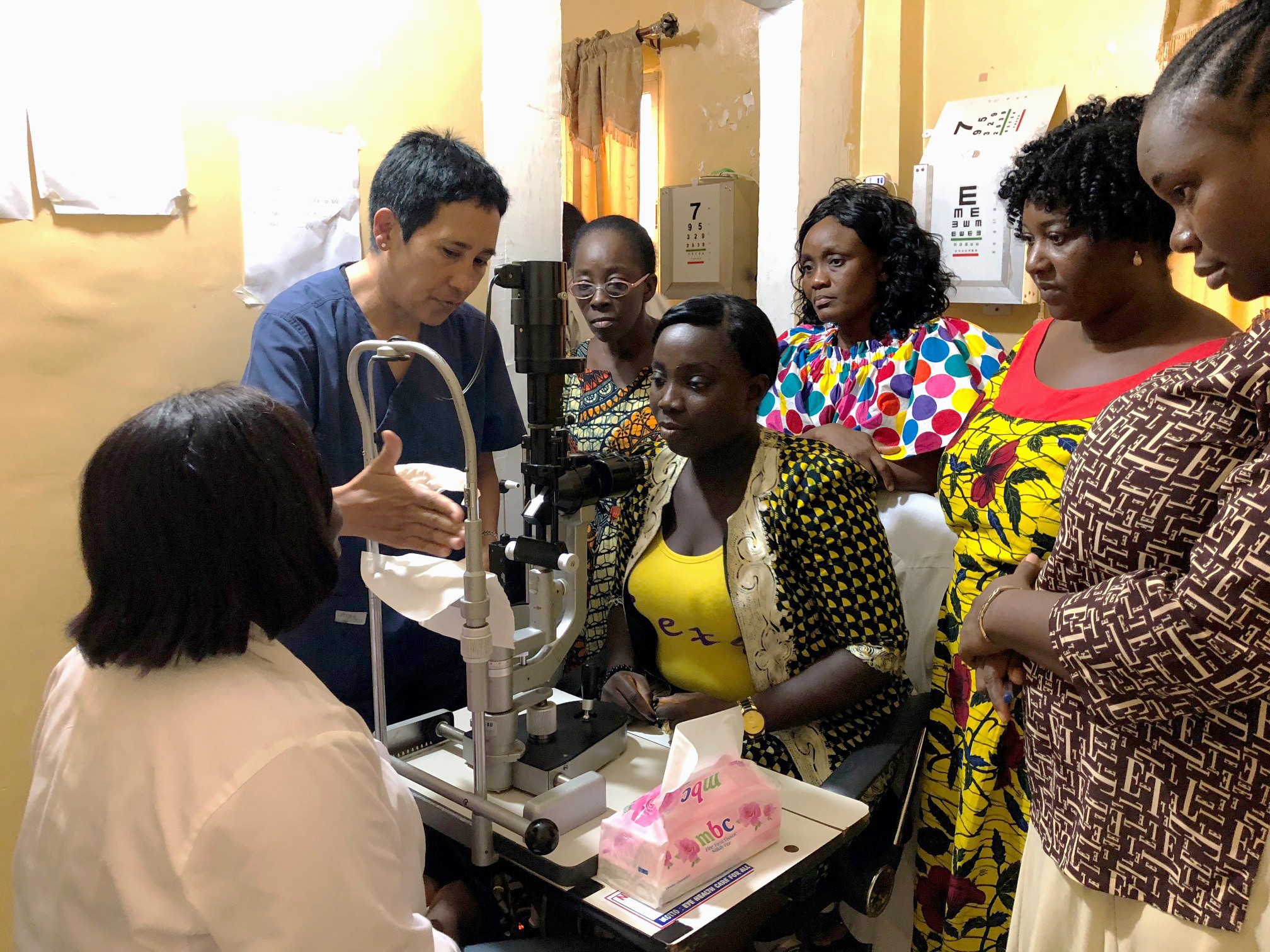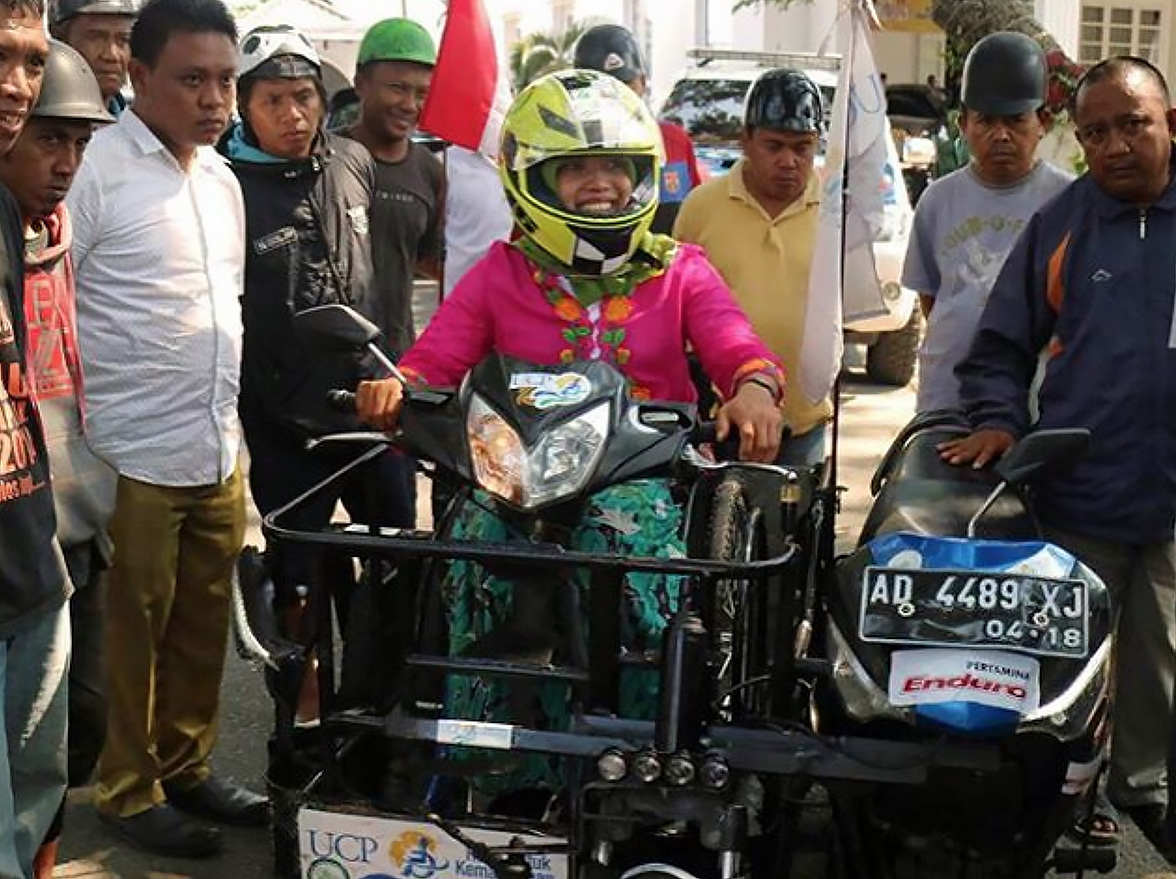-
What We Do
- WHERE WE WORK
-
About Us
 Welcome Message from Carol Jenkins
Welcome Message from Carol JenkinsFor more than 90 years, World Learning has equipped individuals and institutions to address the world’s most pressing problems. We believe that, working together with our partners, we can change this world for the better.
On my travels, I’ve had the opportunity to meet with many of those who have joined us in this mission. In Baghdad, we’ve trained more than 2,300 Iraqi youth who are already giving back at home. In London, our partners in the TAAP Initiative strongly believe that we are all responsible to practice inclusion. And in Vermont, our Experiment in International Living and School for International Training participants prove every day that they have the tools and the determination to change the world.
Please join us in our pursuit of a more peaceful and just world.
- Get Involved
Country: Ghana
IVLP Alum Helps Feed the Aged and Vulnerable in Ghana
Koforidua Food Bank supports 2,000 beneficiaries in 3 months
Ghanaian Inspired to Launch Food Bank After U.S. Exchange
Connecting African and American Culture
Grace Hampton is a visual artist who sees the potential for connections across academic fields, faculty and cultures. The former Vice Provost of Penn State University (PSU) is also a skilled administrator who is familiar with the university’s array of experts across disciplines.
So when Hampton went to Ghana in March on a Fulbright Specialist grant to the Kwame Nkrumah University of Science and Technology (KNUST) in Kumasi and the University for Development Studies (UDS) in Tamale, her major achievement was helping establish a research consortium between the three institutions.
“The goal of the consortium is to create a platform for collaborative engagements that will promote research and enrich and increase the creative capacity of faculty members for the further development of UDS, KNUST and PSU and society as a whole,” explains Hampton, who arrived at Penn State in 1985 and served as Director of the School of Visual Arts, Vice Provost, Professor of Integrative Arts and Art Education, and Senior Faculty Mentor over the years.
“What I’m attempting to do is put together and bring out the best of both systems,” says Hampton, who also previously served an Assistant Program Director at the National Endowment for the Arts in Washington D.C.
Hampton is no stranger to the West African nation; she lived in Ghana for two years and has been traveling there for the past 20. Two decades ago as an up and coming professor at Penn State, she developed a course in African and African American culture, collaborating with experts in Ghana and Nigeria. “Along with the students, I began learning while teaching the course,” she says.
That project was the start of a relationship with the faculty at KNUST and UDS, which has expanded over the years and includes many other projects, as well as student exchanges. The goal of the Fulbright Specialist grant was to formalize the relationship between the three institutions, ensuring it endures well into the future.
During the six-week grant, Hampton met with and matched faculty from Ghana with Penn State faculty to explore research questions of mutual interest. The result, she explains, will create a more dynamic research process that ultimately serves both countries.
The consortium is not only about the arts; Hampton says it is equally important to include faculty from the departments of education, agriculture, medicine, and engineering, as well as other academic areas, so researchers in Ghana and at Penn State can collaborate and exchange ideas to help solve real world problems.
“Ideas are not a one way street,” she says, emphasizing that the benefits will be reciprocal. She has no doubt that Penn State has as much to gain as its Ghanaian counterpart.
As an example, she points to the medical program in KNUST, which is focused on raising the medical standards of Ghana — an issue Penn State Medical School is working on in the U.S. context.
“How does a developing country like Ghana that has a strong sense of culture, people, and history — how do they deal with those issues in comparison with how they would be dealt with in a modern university like Penn State?” Hampton asks.
Another example of a match that came out of the consortium is between faculty of the dance departments.
“We’re looking at the importance of the arts, education, and culture and the differences in how they are viewed traditionally and how they are used within both societies today. They are not so different. A greater cultural awareness and understanding of both cultures can be gained through the work of the consortium,” says Hampton.
Hampton started her career as a public school teacher, but says her training as an artist informs her way of thinking and has been instrumental to her mission as a Fulbright Specialist.
“It starts with a blank canvas — that was the same process I used in developing the consortium. Looking at parts and pulling them together to see how they fit,” she explains. “You bring all your skills to bear. It’s fun and challenging.”
In addition to supporting the establishment of the research consortium, Hampton delivered a special lecture to graduate students at KNUST about how to select a research topic and research methodologies for their thesis and dissertation research. About 50 students attended and participated in a Q&A following her presentation.
She also served as a keynote speaker for the opening of a photo exhibition titled “Ties that Bind: Roots and Routes of Ghana-U.S. Relations, A 75- Year Retrospective- 1930 -2016,” organized by Cape Coast University and the U.S. Embassy in Accra, Ghana.
As Hampton sees it, the Fulbright Specialist program enabled her to help formalize a lasting relationship between academic institutions in Ghana and the U.S. that started informally many years ago. It is the culmination of her life’s work as an artist, administrator, and teacher with a passion for connecting Africa and African American cultures.
Alumni Thematic International Exchange Seminars
Participant Profile
Participants are alumni of U.S. government-sponsored exchange programs and vary in age and level of expertise, but all will be engaged in the seminar topic and highly motivated to create change in their communities.
Please consult the list of U.S. government-sponsored exchange programs below.
- U.S. citizen: https://exchanges.state.gov/us
- Non-U.S. citizen: https://exchanges.state.gov/non-us
Participant Selection
Alumni TIES participants who are not U.S. citizens are nominated by the U.S. Embassies or Consulates in their countries. Please contact the U.S. Embassy or Consulate in your country to learn how you can participate in Alumni TIES. Potential Alumni TIES participants who are living in the United States can apply for specific seminars managed by World Learning. The web link to the online application will be distributed widely by the Office of Alumni Affairs of the Bureau of Educational and Cultural Affairs.
All participants for Alumni TIES seminars are selected by the U.S. Department of State.
Program Design
Alumni TIES seminars take place in six world regions and the U.S.; each seminar is three to four days for small groups of alumni. The seminars include speakers, capacity development trainings, and alumni networking activities. Through the small grants initiative, alumni have the opportunity to take action and make a positive difference in their communities.
Learn More
Watch more videos about the Alumni TIES program.
Read stories from past participants about their experiences at the seminars or with their small grant projects on the Alumni TIES blog.
For information on programs for U.S. government-sponsored exchange program alumni visit the International Exchange Alumni website.
Alumni TIES is sponsored by the U.S. Department of State with funding provided by the U.S. Government and supported in its implementation by World Learning, in partnership with the Office of Alumni Affairs of the Bureau of Educational and Cultural Affairs (ECA).
Digital Communication Network
Examples of Past Digital Communication Network Projects
- Internet vs. Democracy Forum
- Roaring 20s #Digital Forum
- Combatting Disinformation Training Program
- Digital and Media Literacy for NGOs Training Program
- Tolerance and Coexistence 2.0 Forum
- Montenegro Digital Influencers Hub
- Humor and Games for Social Good Forum
Fulbright Specialist Program
What?
Link U.S. Experts and International Institutions
A program of the U.S. Department of State, Bureau of Educational and Cultural Affairs, the Fulbright Specialist Program is a unique opportunity for U.S. academics and established professionals to engage in two- to six-week consultancies at host institutions across the globe. Host institutions, including universities, non-profits, and other organizations, develop and submit projects for approval by the U.S. Embassy or Fulbright Commission in their country in wide-ranging academic and professional fields that build capacity and promote long-lasting linkages between individuals and institutions in the U.S. and abroad.
Why?
Address Priorities and Build Institutional Capacity at Institutions Around the World
An important companion to the traditional Fulbright Scholar Program, the Fulbright Specialist Program differs by providing short-term exchange experiences that tackle discrete, sometimes rapid response, projects. The Fulbright Specialist Program encourages participation of both university faculty and highly experienced non-academics, including legal experts, business professionals, public health practitioners, scientists, IT professionals, artists, and journalists. The program is a mutually beneficial opportunity for the Specialist who may not be available to leave their position for an extended period of time and the host institution which needs an experienced partner to jointly tackle a problem or examine an issue on a short-term basis.
How?
Become a Fulbright Specialist: Apply to Join the Roster
Fulbright Specialists are a diverse group of highly experienced, well-established faculty members and professionals who represent a wide variety of academic disciplines and professions. In order to be eligible to serve as a Fulbright Specialist, candidates must have significant experience in their respective professional field and be a U.S. citizen at time of application. Eligible disciplines and professional fields supported by the Fulbright Specialist Program are listed below.
- Agriculture
- American Studies
- Anthropology
- Archeology
- Biology Education
- Business Administration
- Chemistry Education
- Communications and Journalism
- Computer Science and Information Technology
- Economics
- Education
- Engineering Education
- Environmental Science
- Law
- Library Science
- Math Education
- Peace and Conflict Resolution Studies
- Physics Education
- Political Science
- Public Administration
- Public/Global Health
- Social Work
- Sociology
- Urban Planning
Interested candidates can find more information about the Fulbright Specialist Program and apply to serve as a Specialist at fulbrightspecialist.worldlearning.org. Candidates who meet all eligibility requirements will have their full applications reviewed by a panel of their professional peers. Candidates who are approved by the peer review panels will then join the Fulbright Specialist Roster. Individuals remain on the Specialist Roster for a three-year term and are eligible to be matched with a host institution’s project abroad during that tenure.
The following costs are covered for those Fulbright Specialists who are matched to a project: international and domestic airfare, ground transportation, visa fees, lodging, meals, and incidentals. A daily honorarium is also provided.
Become a Host: Bring a Fulbright Specialist to Your Institution
The Fulbright Specialist Program allows universities, cultural centers, non-governmental organizations, and other institutions abroad to host a leading U.S. academic or professional to work on diverse, short-term collaborative projects where the Specialist conducts activities which may include, but are not limited to:
- Delivering a seminar or workshop
- Consulting on faculty or workforce development
- Developing academic or training curricula and materials
- Lecturing at the graduate or undergraduate level
- Conducting needs assessments or evaluations for a program or institution
Institutions interested in hosting a Fulbright Specialist should contact their local Fulbright Commission or U.S. Embassy for country-specific requirements and deadlines.
Contact information for all participating countries is available on the fulbrightspecialist.worldlearning.org website.
For more information or questions about the Fulbright Specialist Program, please email [email protected].
The Fulbright Specialist Program is a program of the U.S. Department of State with funding provided by the U.S. government and administered by World Learning.
Online Professional English Network Program (OPEN Program)
Special Programs to Address the Needs of Survivors
Grantees of the program included:
Albanian Disability Rights Foundation, Al Hussein Society, Association for the Physically Disabled of Kenya, Buckner International, Catholic Relief Services, The Center for Victims of Torture, Christian Blind Mission International, Cooperative Orthotic and Prosthetic Enterprise, CURE International, EveryChild, Friends International, Global Communities, Handicap International, Health Volunteers Overseas, International Nepal Fellowship, International Rescue Committee, Leonard Cheshire Disability, Mobility India, Motivation Charitable Trust, Motivation Romania Foundation, St. Boniface Haiti Foundation, United Cerebral Palsy Wheels for Humanity, University of Iowa, University of Pittsburgh – International Society of Wheelchair Professionals, Whirlwind Wheelchair International, World Institute on Disability, and World Vision.




